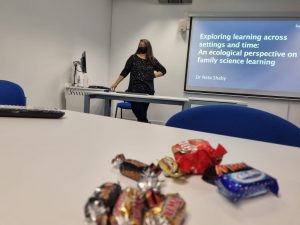 Recently, our colleague Dr Neta Shaby presented to the Education School on her work on family science learning and engagement. Among other things, Neta highlighted work with Dr. Dana Vedder-Weiss (Ben Gurion University), from her recent ESERA 2021 presentation:
Recently, our colleague Dr Neta Shaby presented to the Education School on her work on family science learning and engagement. Among other things, Neta highlighted work with Dr. Dana Vedder-Weiss (Ben Gurion University), from her recent ESERA 2021 presentation:
Accumulating evidence suggests that much of what people come to know about the world, including the world of science, derives from experiences not only in schools but in a variety of contexts across their lifetime, such as homes, museums, and parks. The family plays a crucial role in science learning (Bricker & Bell, 2014). The COVID19 pandemic highlights most acutely the significant role of family learning, as people spend more time at home with their families, learning about the pandemic and its implications in a myriad of informal ways, through news reports, the internet, family conversations, etc. (Pattison et al., 2020). However, families differ in the resources available to them and, consequently, in how they engage with science (Archer et al., 2012). In this study, we explore the dynamics of naturally occurring family interaction, taking a sociocultural approach, viewing learning as guided participation in culturally organized activities. In our definition, resources constitute objects (social or material) and abstract constructs – either conceptual, procedural, or epistemological. In this presentation, we demonstrate the use of resources in one setting and the way it is shaped by resource use in other settings. This study contributes a novel conceptual framework to the study of informal science learning across settings, affording the exploration of how engagement with science learning in various families can be supported by different resources across various settings.
If you are interested in these themes don’t hesitate to contact Neta (See profile for mail address).
Comments are closed